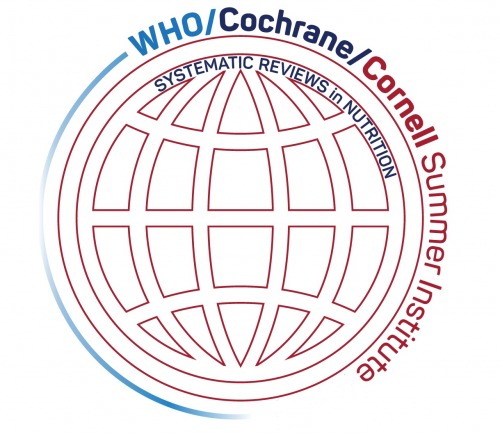Primary tabs
Program Topics

WHO/Cochrane/Cornell University Joan Klein Jacobs Center for Precision Nutrition and Health Summer Institute for Systematic Reviews in Nutrition for Global Policy Making
Program Topics
Through didactic sessions and hands-on exercises, participants will learn the process of conducting and publishing a systematic review on nutrition interventions by participating in the development and publication of a systematic review. This Institute includes an online component followed by an interactive and in-person component and participants actively work on reviews to bring concepts to life through direct illustration and practice. Reviews produced by the participants have been published (both Cochrane and non-Cochrane) and used in WHO guidelines for member states. Review topics vary from year-to-year and participants are encouraged to bring forward reviews that they would like to work on with the team.
Topic of the systematic reviews we work on changes from year to year and varies depending on the interests of faculty mentors and participants. We welcome participants to bring a review they are working on, provided there is a willingness to collaborate. If you have a review you are working on, please make sure to tell us about it in your application materials. A few examples of past topics that led to published reviews include the following:
- Wheat flour fortification with iron for reducing anemia and improving iron status in whole and at-risk populations
- Biofortified staple crops with increased micronutrient content for improving vitamin and mineral status in populations
- Supplementation with iodine for women during pregnancy and lactation
- Folic acid supplementation in children living in malaria-endemic areas
- Growth monitoring and promotion (GMP) for children in low- and middle-income countries
- Effects of oral vitamin D supplementation on linear growth and other health outcomes among children under five years of age
- Caregiver involvement in interventions for improving children's dietary intake and physical activity behaviors
- Effectiveness of provision of animal-source foods for supporting optimal growth and development in children 6 to 59 months of age
- Health Facility Staff Training for Improving Breastfeeding Outcome: A Systematic Review for Step 2 of the Baby-Friendly Hospital Initiative
- Healthy eating interventions delivered in early childhood education and care settings for improving the diet of children aged six years and below
- Precision nutrition-based interventions for the management of obesity in children and adolescents up to the age of 19 years
- Gut microbiome-based interventions for the management of obesity in children and adolescents up to the age of 19 years
Participants usually come to the Institute with a review they wish to develop, a review they are working on, or as part of a team working on a review. A few participants will be assigned to topic areas based on their interests and availability. We will work on reviews in collaborative groups. During the Institute, groups are led by internal mentors at the Institute and/or by external mentors who are senior leaders on a review.
Participants will be required to complete preparatory work prior to beginning the Institute, including the online asynchronous week and the work on an actual review to meet with the team members. Participants will be strongly encouraged to work on a protocol or title registration prior to attending the program so that they leverage the training to the fullest extent possible, and they will be expected to lead or co-lead the completion of the systematic review after the Institute is completed.
Participants will be provided with access to the Cornell Libraries, access to Cornell Statistical Consulting Unit and other facilities necessary to support the review work, and Cornell library access will continue post-Institute for one year.
Topics to be covered in the Institute are delivered in a setting that provides opportunities for hands-on, small-group, interactive learning directly relevant to each review topic. The session topics typically include the following:
- RevMan introduction
- RevMan advanced
- GRADE introduction
- GRADE advanced
- PICO and development of the question, logic models
- Protocol Development and Registration
- Summary of Findings Table, Introduction
- Summary of Findings Table, Advanced
- Epidemiology methods: effect estimates and understanding risk of bias
- Library: search strategies/implementation
- Library: resources at Cornell University
- Statistical methods: meta-analysis introduction, forest plot and heterogeneity
- Statistical methods: random effects/fixed effects, cluster randomized studies and advanced meta-analysis
- Statistical methods: resources at Cornell University
- Non-randomized studies of interventions in Cochrane reviews
 |
WHO Cochrane Cornell Summer Institute, Contact InformationPatricia A. Cassano, PhD, Director, Summer Institute |
Please visit our registration page for details on how to apply.